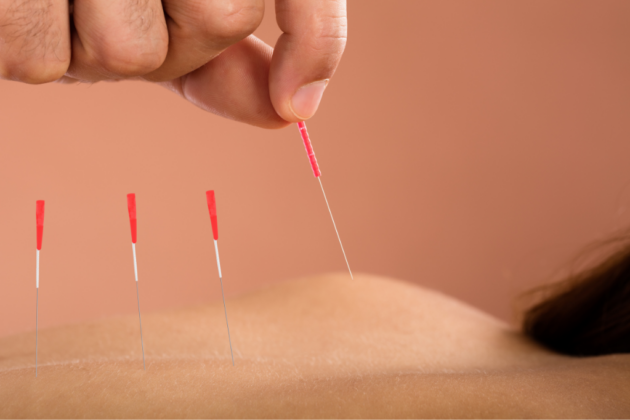Your Pregnancy Care Checklist: A Guide for Expecting Moms
From the moment you see the two blue lines indicating a positive (the only good kind of “positive” test result you probably want to get these days), you can begin caring for your whole body. And there are a variety of wellness specialists who can help you do so.
The morning sickness and exhaustion might start to set in at the beginning of the first trimester. One solution? Seeing an acupuncturist. Preparing mentally for parenthood is a nine-month-long process, and seeing a mental health practitioner might also be helpful in that journey. As you get into the second and third trimesters, other specialists can help you prepare your body specifically for birth.
Read on to learn more about the pregnancy care specialists available to you—beyond your OB/GYN—so you can plan for each trimester.
What pregnancy care looks like
Pregnancy care goes beyond prenatal check-ups with your OB/GYN. It’s about taking care of your mental health, your nutrition, and your physical well-being so that your baby is healthy, of course. Pregnancy care is also about making sure that you feel well leading up to and after delivery.
For example, 6% of people develop gestational diabetes during pregnancy, which is a good reason, but isn’t the only reason you might check in with a nutritionist (1). And depression doesn’t just occur postpartum. About 1 in 10 people experience depression during pregnancy, according to the American College of Obstetricians and Gynecology, and could use more mental health support (2).
You shouldn’t just see a practitioner when you have a diagnosable health issue during pregnancy. Preventative care is important for preparing your body for birth and the postpartum period, so you might want to work with a pelvic floor physical therapist and lactation consultant in the later stages of pregnancy too.
>> Read more: Benefits of pelvic floor therapy & How pelvic floor therapy during pregnancy can help
First trimester pregnancy care
It’s never too early in your pregnancy to check in with a mental health therapist. Twenty percent of people experience mental health issues during pregnancy (3). Meeting with a mental health professional while you’re pregnant could help you cope with any mental health concerns that come up throughout pregnancy.
It can also be beneficial for your provider to already know you well when you are working through the postpartum period, in which baby blues, postpartum depression, postpartum anxiety, and postpartum OCD are most prevalent. Research has found that counseling and adequate mental health support can be helpful in preventing postpartum depression, which affects 1 in 7 people (4).
Studies have also shown that acupuncture could be another intervention for alleviating depressive symptoms during pregnancy (5). Acupuncture can also be beneficial for the nausea and vomiting in early pregnancy, according to a 2015 review. (6). It can even help treat hyperemesis gravidarum, a severe form of morning sickness and vomiting, and potentially shorten hospitalization periods for the condition (7).
Second trimester pregnancy care
During your second trimester, the morning (and evening) sickness should hopefully dissipate, and this can be the right moment to focus on prenatal nutrition. Seeing a dietitian is not just about weight loss or weight gain, or about gestational diabetes, if you are diagnosed with it, but about eating to maintain energy levels, which can be a major challenge all throughout pregnancy.
A registered dietitian or registered dietitian nutritionist can help you strategize to make sure you’re getting in enough protein, healthy fats, and vegetables to nourish your body and your baby’s, along with the essential pregnancy nutrients, like iron.
This could also be a great time to start working with a pelvic floor physical therapist on guided pelvic floor strengthening techniques. About 50% of people end up having pelvic floor disorders, which could include symptoms like urinary incontinence and pain during sex, during or after pregnancy (8). Reviews have shown that pelvic floor physical therapy can help strengthen the pelvic floor and ultimately decrease urinary incontinence in the first few months postpartum (9).
>> Learn more: Symptoms & signs of gestational diabetes
Third trimester pregnancy care
And now for the final stretch… Keep seeing an acupuncturist through the third trimester: It could help your delivery. Some evidence suggests that certain techniques used in acupuncture could help turn a baby that’s breech (feet forward) to head forward in order to encourage a vaginal delivery (10). There’s also a chance acupuncture could help reduce pain in the beginning stages of labor, ACOG states (11).
Right before birth, it’s a great idea to check in with a lactation consultant if you plan to try breastfeeding. A board-certified lactation consultant can meet with you before birth via video or in-person to show you how to hold the baby and latch while nursing, and also how to set up and fit a breast pump to your body. The lactation consultant can walk you through what to expect when your body produces colostrum, a high-protein substance beneficial to newborn nutrition, and answer any other breastfeeding questions that come up (12).
Seventy five percent of people choose to breastfeed at birth, but the rate falls to about 43% after 6 months—lactation consultants can help with not only preparing for breastfeeding but increasing your comfort level and longevity with breastfeeding or pumping in the long run if that suits your lifestyle (13).
References
- Diabetes During Pregnancy. [Internet]. Atlanta (GA): Centers for Disease Control and Prevention (US); 2018-. Available from: https://www.cdc.gov/reproductivehealth/maternalinfanthealth/diabetes-during-pregnancy.htm#:~:text=develops%20during%20pregnancy.-,How%20Common%20Is%20Diabetes%20During%20Pregnancy%3F,has%20increased%20in%20recent%20years.
- Depression During Pregnancy. [Internet]. Washington DC: The American College of Obstetricians and Gynecologists (US); 2020-. Available from: https://www.acog.org/womens-health/faqs/depression-during-pregnancy
- Savory NA, Hannigan B, SAnders J. Women’s experience of mild to moderate mental health problems during pregnancy, and barriers to receiving support. Midwifery. 2022 Feb 25; 108.
- US Preventative Services Task Force. Interventions to Prevent Perinatal Depression. JAMA. 2019 Feb 12; 321(6):580-587.
- Manber R, Schnyer RN, Lyell D, Chambers AS, Caughey AB, Druzin M, Carlyle E, Celio C, Gress JL, Huang MI, Kalista T, Martin-Okada R, Allen JJB. Acupuncture for depression during pregnancy: a randomized controlled trial. Obstet Gynecol. 2010 Mar; 115(3):511-520.
- Matthews A, Haas DM, O’Mathúna DP, Dowswell T. Interventions for nausea and vomiting in early pregnancy. Cochrane Database Syst Rev. 2015 Sep 8;2015(9).
- Lu H, Zheng C, Zhong Y, Cheng L, Zhou Y. Effectiveness of Acupuncture in the Treatment of Hyperemesis Gravidarum: A Systematic Review and Meta-Analysis. Evidence-Based Complementary and Alternative Medicine. 2021 Jul 28.
- Palmieri S, De Bastiani SS, Degliuomini R, Ruffolo AF, Casiraghi A, Vergani P, Gallo P, Magoga G, Cicuti M, Parma M, Frigerio M. Prevalence and severity of pelvic floor disorders in pregnant and postpartum women. International Journal of Gynecology & Obstetrics. 2021 November 15.
- Woodley SJ, Boyle R, Cody JD, Mørkved S, Hay-Smith EJC. Pelvic floor muscle training for prevention and treatment of urinary and fecal incontinence in antenatal and postnatal women. Cochrane Database Syst Rev. 2017 Dec 22;12(12).
- Brici P, Franconi G, Scatassa C, Fabbri E, Assirelli P. Turning Foetal Breech Presentation at 32-35 Weeks of Gestational Age by Acupuncture and Moxibustion. Evidence-Based Complementary and Alternative Medicine. 2019 Jun 9.
- Bryant AS, Border AE. Approaches to Limite Intervention During Labor and Birth. The American College of Obstetricians and Gynecologists. 2019 Feb; 766.
- Kellams A, Harrel C, Omage S, Gregory C, Rosen-Carole C. ABM Clinical Protocol #3: Supplementary Feedings in the Healthy Term Breastfed Neonate. Breastfeeding Medicine. 2017; 12 (3).
- Breastfeeding: Surgeon General’s Call to Action Fact Sheet. [Internet]. Washington, DC: U.S. Department of Health & Human Services (US). 2011-. Available from: https://www.hhs.gov/surgeongeneral/reports-and-publications/breastfeeding/factsheet/index.html
From the moment you see the two blue lines indicating a positive (the only good kind of “positive” test result you probably want to get these days), you can begin caring for your whole body. And there are a variety of wellness specialists who can help you do so.
The morning sickness and exhaustion might start to set in at the beginning of the first trimester. One solution? Seeing an acupuncturist. Preparing mentally for parenthood is a nine-month-long process, and seeing a mental health practitioner might also be helpful in that journey. As you get into the second and third trimesters, other specialists can help you prepare your body specifically for birth.
Read on to learn more about the pregnancy care specialists available to you—beyond your OB/GYN—so you can plan for each trimester.
What pregnancy care looks like
Pregnancy care goes beyond prenatal check-ups with your OB/GYN. It’s about taking care of your mental health, your nutrition, and your physical well-being so that your baby is healthy, of course. Pregnancy care is also about making sure that you feel well leading up to and after delivery.
For example, 6% of people develop gestational diabetes during pregnancy, which is a good reason, but isn’t the only reason you might check in with a nutritionist (1). And depression doesn’t just occur postpartum. About 1 in 10 people experience depression during pregnancy, according to the American College of Obstetricians and Gynecology, and could use more mental health support (2).
You shouldn’t just see a practitioner when you have a diagnosable health issue during pregnancy. Preventative care is important for preparing your body for birth and the postpartum period, so you might want to work with a pelvic floor physical therapist and lactation consultant in the later stages of pregnancy too.
>> Read more: Benefits of pelvic floor therapy & How pelvic floor therapy during pregnancy can help
First trimester pregnancy care
It’s never too early in your pregnancy to check in with a mental health therapist. Twenty percent of people experience mental health issues during pregnancy (3). Meeting with a mental health professional while you’re pregnant could help you cope with any mental health concerns that come up throughout pregnancy.
It can also be beneficial for your provider to already know you well when you are working through the postpartum period, in which baby blues, postpartum depression, postpartum anxiety, and postpartum OCD are most prevalent. Research has found that counseling and adequate mental health support can be helpful in preventing postpartum depression, which affects 1 in 7 people (4).
Studies have also shown that acupuncture could be another intervention for alleviating depressive symptoms during pregnancy (5). Acupuncture can also be beneficial for the nausea and vomiting in early pregnancy, according to a 2015 review. (6). It can even help treat hyperemesis gravidarum, a severe form of morning sickness and vomiting, and potentially shorten hospitalization periods for the condition (7).
Second trimester pregnancy care
During your second trimester, the morning (and evening) sickness should hopefully dissipate, and this can be the right moment to focus on prenatal nutrition. Seeing a dietitian is not just about weight loss or weight gain, or about gestational diabetes, if you are diagnosed with it, but about eating to maintain energy levels, which can be a major challenge all throughout pregnancy.
A registered dietitian or registered dietitian nutritionist can help you strategize to make sure you’re getting in enough protein, healthy fats, and vegetables to nourish your body and your baby’s, along with the essential pregnancy nutrients, like iron.
This could also be a great time to start working with a pelvic floor physical therapist on guided pelvic floor strengthening techniques. About 50% of people end up having pelvic floor disorders, which could include symptoms like urinary incontinence and pain during sex, during or after pregnancy (8). Reviews have shown that pelvic floor physical therapy can help strengthen the pelvic floor and ultimately decrease urinary incontinence in the first few months postpartum (9).
>> Learn more: Symptoms & signs of gestational diabetes
Third trimester pregnancy care
And now for the final stretch… Keep seeing an acupuncturist through the third trimester: It could help your delivery. Some evidence suggests that certain techniques used in acupuncture could help turn a baby that’s breech (feet forward) to head forward in order to encourage a vaginal delivery (10). There’s also a chance acupuncture could help reduce pain in the beginning stages of labor, ACOG states (11).
Right before birth, it’s a great idea to check in with a lactation consultant if you plan to try breastfeeding. A board-certified lactation consultant can meet with you before birth via video or in-person to show you how to hold the baby and latch while nursing, and also how to set up and fit a breast pump to your body. The lactation consultant can walk you through what to expect when your body produces colostrum, a high-protein substance beneficial to newborn nutrition, and answer any other breastfeeding questions that come up (12).
Seventy five percent of people choose to breastfeed at birth, but the rate falls to about 43% after 6 months—lactation consultants can help with not only preparing for breastfeeding but increasing your comfort level and longevity with breastfeeding or pumping in the long run if that suits your lifestyle (13).
References
- Diabetes During Pregnancy. [Internet]. Atlanta (GA): Centers for Disease Control and Prevention (US); 2018-. Available from: https://www.cdc.gov/reproductivehealth/maternalinfanthealth/diabetes-during-pregnancy.htm#:~:text=develops%20during%20pregnancy.-,How%20Common%20Is%20Diabetes%20During%20Pregnancy%3F,has%20increased%20in%20recent%20years.
- Depression During Pregnancy. [Internet]. Washington DC: The American College of Obstetricians and Gynecologists (US); 2020-. Available from: https://www.acog.org/womens-health/faqs/depression-during-pregnancy
- Savory NA, Hannigan B, SAnders J. Women’s experience of mild to moderate mental health problems during pregnancy, and barriers to receiving support. Midwifery. 2022 Feb 25; 108.
- US Preventative Services Task Force. Interventions to Prevent Perinatal Depression. JAMA. 2019 Feb 12; 321(6):580-587.
- Manber R, Schnyer RN, Lyell D, Chambers AS, Caughey AB, Druzin M, Carlyle E, Celio C, Gress JL, Huang MI, Kalista T, Martin-Okada R, Allen JJB. Acupuncture for depression during pregnancy: a randomized controlled trial. Obstet Gynecol. 2010 Mar; 115(3):511-520.
- Matthews A, Haas DM, O’Mathúna DP, Dowswell T. Interventions for nausea and vomiting in early pregnancy. Cochrane Database Syst Rev. 2015 Sep 8;2015(9).
- Lu H, Zheng C, Zhong Y, Cheng L, Zhou Y. Effectiveness of Acupuncture in the Treatment of Hyperemesis Gravidarum: A Systematic Review and Meta-Analysis. Evidence-Based Complementary and Alternative Medicine. 2021 Jul 28.
- Palmieri S, De Bastiani SS, Degliuomini R, Ruffolo AF, Casiraghi A, Vergani P, Gallo P, Magoga G, Cicuti M, Parma M, Frigerio M. Prevalence and severity of pelvic floor disorders in pregnant and postpartum women. International Journal of Gynecology & Obstetrics. 2021 November 15.
- Woodley SJ, Boyle R, Cody JD, Mørkved S, Hay-Smith EJC. Pelvic floor muscle training for prevention and treatment of urinary and fecal incontinence in antenatal and postnatal women. Cochrane Database Syst Rev. 2017 Dec 22;12(12).
- Brici P, Franconi G, Scatassa C, Fabbri E, Assirelli P. Turning Foetal Breech Presentation at 32-35 Weeks of Gestational Age by Acupuncture and Moxibustion. Evidence-Based Complementary and Alternative Medicine. 2019 Jun 9.
- Bryant AS, Border AE. Approaches to Limite Intervention During Labor and Birth. The American College of Obstetricians and Gynecologists. 2019 Feb; 766.
- Kellams A, Harrel C, Omage S, Gregory C, Rosen-Carole C. ABM Clinical Protocol #3: Supplementary Feedings in the Healthy Term Breastfed Neonate. Breastfeeding Medicine. 2017; 12 (3).
- Breastfeeding: Surgeon General’s Call to Action Fact Sheet. [Internet]. Washington, DC: U.S. Department of Health & Human Services (US). 2011-. Available from: https://www.hhs.gov/surgeongeneral/reports-and-publications/breastfeeding/factsheet/index.html
















